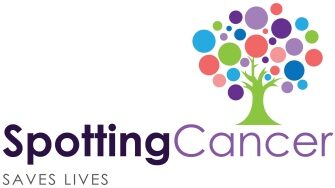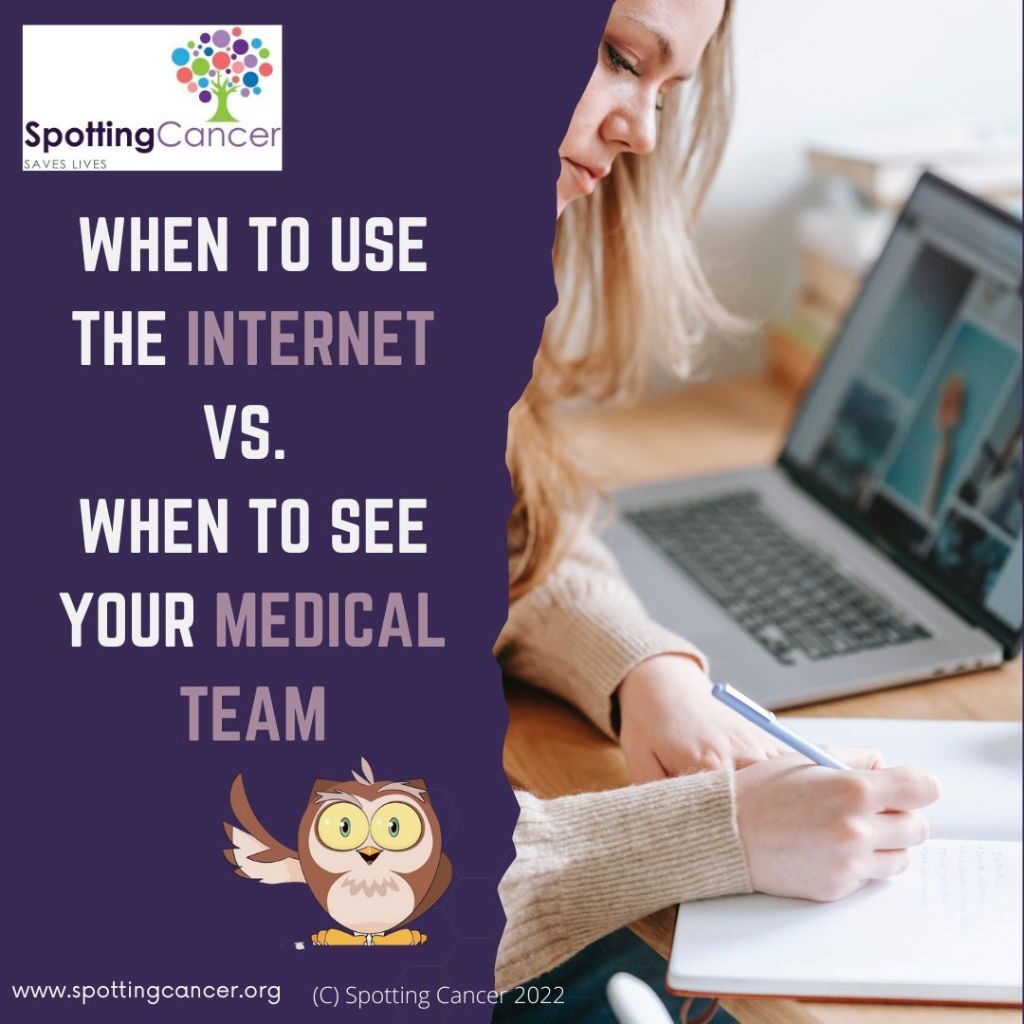Using Online Medical Information
Using information online can be a positive thing. Online health information is becoming an increasingly important component of health and disease management. It is best to be used to:- Raise a “red flag” to discuss with your medical provider if a sign or symptom is detected
- Learn more about your diagnosis than your provider has time to teach you
- Find support from other people with the same chronic condition
- Check bottom of the page for Gold Transparency status or HON code. These are certifications which requires that sites meet certain requirements.
- Look for citations throughout the site and or reference list. If the site doesn’t tell you where the information came from, be skeptical.
- Look for update dates at the top or bottom of the site so you know you’re getting current information.
- Does the site provide information, tools, and methods for early detection of signs and symptoms instead of conclusive diagnosis.
What is a Self-Diagnosis?
The Internet can teach us a great deal of things and provide us with bounties of information. However, it can also mislead us and cause us undue stress and fear. Sadly, when we act upon that stress and/or fear, we might make choices that ultimately cost us even more in terms of our health. Self-diagnosis1 is one way that some people get in trouble when using the Internet.- An individual notices that they aren’t feeling quite right or that they have formed a physical abnormality (such as a bump or skin tag) on their body that they had not noticed before.
- That person gets concerned about whatever is going on with their body and begins to conduct an Internet search.
- The person searches for broad terms related to whatever they are experiencing. They might search for something like “causes of fatigue” for example.
- That search produces a large number of results and potential causes for the broad terms that they have searched.
- The individual views the scariest possible results and begins to assume that those things apply to their case.
- That person begins to believe that they have cancer or some other extreme ailment regardless of the truth of the matter.
Cyberchondria: A Developing Issue in Our Society
There are reasons why medical professionals spend many years and great sums of money to attend medical school. It is so they can accurately diagnose patients that they attend to. We are all extremely fortunate that there are people in our society who are happy to take on this type of work. However, there are far too many people who attempt to substitute an online search for a doctor’s visit.Those who suffer from cyberchondria are often suffering in a prison of their own making. This is to say that they create the circumstances through which they raise their own anxiety levels. However, once one is locked in this cycle, it can be extremely hard to get out of. The increased anxiety might lead to more Internet searching, which leads to more suspicions about one’s conditions, and the cycle repeats itself. Health experts4 simply say that backing away from the computer and avoiding the temptation to self-diagnosis is the best way to avoid this outcome.
Big Problems with Self-Diagnosis Via the Internet
To fully understand the path that you put yourself on when you attempt to self-diagnosis via the Internet, consider the following reasons why diagnoses via search engines is such a bad idea.1) Source Reliability is Questionable
Anyone can post online. Information may be inaccurate, misleading, or unintentionally manipulated. The Roman-era poet Virgil5 once mused: “A lie is halfway round the world before the truth has got its boots on”. This famous quote is even more true today than ever before. Misinformation and outright lies tend to spread like wildfire throughout the Internet, and that certainly applies to information related to one’s health and well-being. People might turn to the Internet for information about their health, but it is one of the least reliable resources to rely upon for a conclusive diagnosis. Therefore, you might end up with very inaccurate information on which you make pressing health choices. That is not wise.2) Diagnosis Based on Broad Symptoms
It is extremely challenging to diagnose broad symptoms. If you type in that you are feeling tired, this could be caused by a great number of things. You might be dehydrated, or you might not have gotten enough sleep last night. It is certainly also possible that something more serious is going on. However, it is truly impossible to diagnose something like that with any level of certainty unless you see a medical professional about it who has some significant training in these matters.3) Becoming overly certain
You may be convinced by your self-diagnosis and then have trouble believing a different, and more accurate diagnosis from a true expert….your medical provider.4) Different People Have Different Symptoms
Every individual will experience symptoms differently. Symptoms that manifest in one individual might mean something completely different when they manifest in another. Therefore, it is virtually useless to search for symptoms online without more context and hope to get an accurate diagnosis.5) Misunderstanding What Symptoms Mean
Again, it is always dangerous for a layperson to try to diagnose their own symptoms. What they are experiencing might be very real, but it might not be life threatening at all. For example, someone who experiences pain in their side might have something like a kidney stone. If they read that side pain might be related to cancer, then they may incorrectly assume that they have cancer instead of a kidney stone. That leaves them vulnerable to not receiving treatment for their kidney stone, and that can complicate their health outcomes.6) Dangerous treatments
Treating yourself based on inherit information can lead to serious harm from side effects, overdose, dangerous drug interactions, or taking something ill-advised due to your medical history.7) Ignorance of Medical Terms
There is nothing to be ashamed of if you are ignorant of certain medical terms. You didn’t go to medical school, and you aren’t expected to know these things. However, that lack of knowledge might lead to confusion and misunderstanding on your part. If you rely on a search engine result to diagnose your symptoms, you might be doomed to misunderstand what illness or disease you are truly dealing with.8) Only Doctors Can Order Tests to Confirm a Diagnosis
Conclusive diagnosis generally requires a variety of tests. The Internet does NOT allow ordering a test to confirm your illness. Only a medical provider can do that for you.Why You Should Always Have a Doctor Diagnose Your Symptoms
There is no excuse for not seeing a doctor if you are honestly concerned about a potential diagnosis. A doctor can run tests to see if this is something that you actually need to worry about. He or she can also help you figure out what steps you need to take next to address the problem. Your primary doctor also has a team of specialists that can provide expertise advise to determine your illness.What Does SpottingCancer.org Provide
SpottingCancer.org, when it comes to cancer symptoms provides a resource that can help you detect a “red flag”. As mentioned previously, instead of listing a diagnosis and then symptoms that go along with it, the site lists the signs and symptoms that you should watch for and if necessary, speak to your medical team about them.SUMMARY
The internet has changed everything. People used to get the bulk of their health information from their doctors and other health care providers. Now, anyone can easily access health-related information and people come to appointments armed with information. However, some is credible and some is not. Even when the website itself is accurate, its possible for someone without medical training to misinterpret it.Resources
1 https://patient.info/news-and-features/does-self-diagnosis-work-and-what-are-the-dangers
2 https://patient.info/news-and-features/does-self-diagnosis-work-and-what-are-the-dangers
3 https://www.wect.com/2019/06/24/study-finds-us-citizens-turn-google-before-their-doctor/
4 https://www.healthline.com/health/please-stop-using-doctor-google-dangerous

